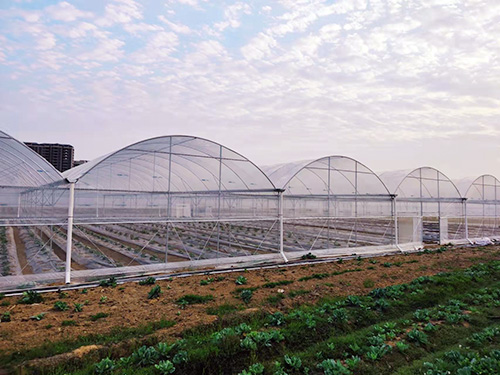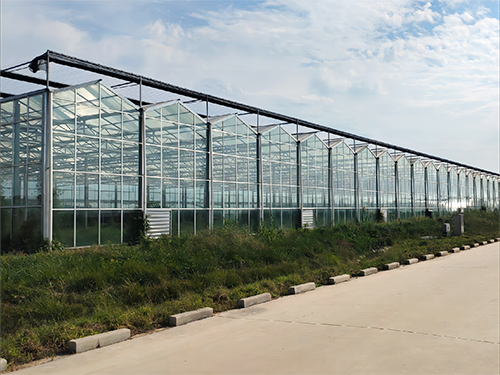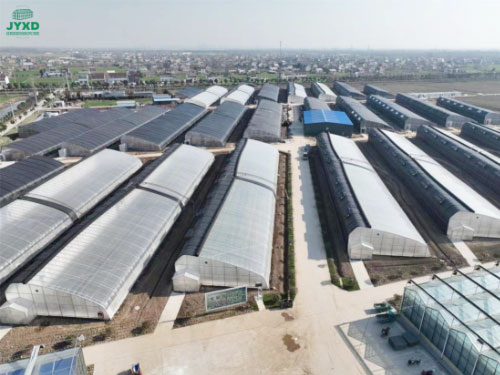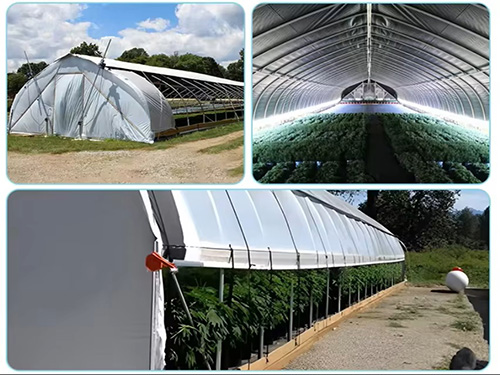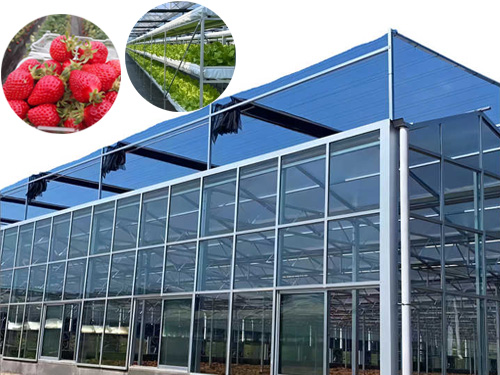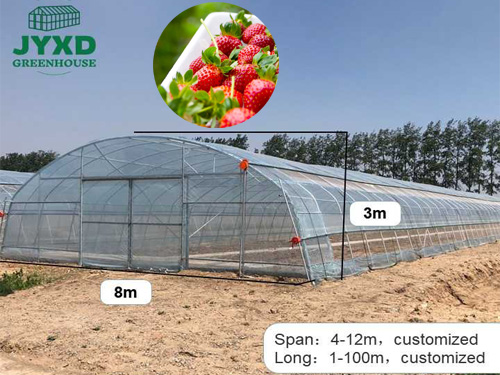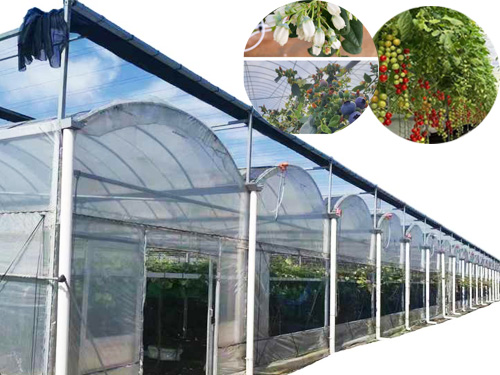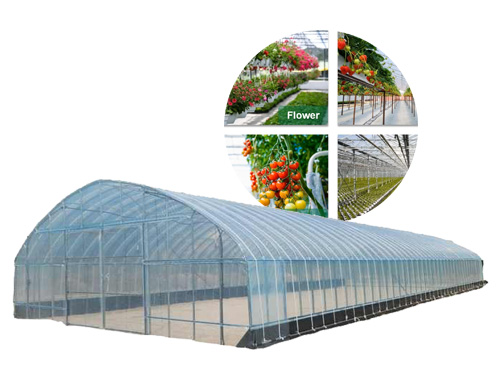NEWS DETAILS
NEWS INFORMATION
How to Implement an Intelligent Irrigation System in Greenhouses to Improve Water Resource Efficiency
AUTHOR:jyxd-greenhouse DATE:2025-01-03 11:13:12 HITS:174
In modern agriculture, efficient water resource management is crucial. In greenhouse cultivation, water management not only affects crop growth but also impacts production costs and sustainability. Traditional irrigation methods often result in water waste, uneven distribution, and soil salinity accumulation. Therefore, introducing an intelligent irrigation system can significantly improve water resource efficiency, reduce costs, and increase crop yields. This article will detail how to implement an intelligent irrigation system in greenhouses to maximize water resource efficiency.
Advantages of an Intelligent Irrigation System
1. Precise Water Quantity Control
An intelligent irrigation system automatically adjusts water quantity according to the actual needs of crops, avoiding over-irrigation and water waste.
2. Cost Savings on Water Resources
Efficient irrigation technology significantly reduces water consumption, lowering irrigation costs.
3. Improved Crop Yield and Quality
Precise irrigation enhances the growing environment for crops, resulting in higher yields and better quality.
4. Automation and Intelligent Management
Intelligent irrigation systems enable automated control, reducing reliance on manual labor and improving management efficiency.
5. Environmental Sustainability
Proper water resource usage helps protect soil structure, reduce pollution, and enhance sustainability.
Methods to Implement an Intelligent Irrigation System in Greenhouses
1. Drip Irrigation Technology
· Precision Drip Irrigation System
Install drip irrigation pipelines in the greenhouse to deliver water directly to the plant roots. Drip irrigation minimizes water waste while supplying the necessary moisture to crops.
· Automated Control Valves
Equipped with intelligent control valves, the system automatically adjusts water flow based on soil moisture levels and weather conditions.
2. Micro-Sprinkler Technology
· Efficient Coverage Micro-Sprinkler System
Micro-sprinkler systems are often used in large greenhouses to provide even water coverage. This system cools the environment and irrigates plants simultaneously.
· Intelligent Micro-Sprinkler Control System
Combined with sensors, the system automatically adjusts the micro-sprinkler operation to ensure even water distribution for crops.
3. Rainwater Collection and Storage System
· Rainwater Collection Devices
Install rainwater collection devices around the greenhouse to gather rainfall, store it, and use it for irrigation.
· Storage Tanks and Filtration Systems
Install efficient storage tanks and filtration systems to ensure collected rainwater remains clean and free of contaminants, allowing for long-term storage and use.
4. Soil Moisture Sensors and Automation Systems
· Intelligent Moisture Monitoring Sensors
Install soil moisture sensors in the greenhouse soil to monitor moisture levels in real-time. The system automatically adjusts irrigation timing and water quantity based on sensor data.
· Centralized Control System
Connect sensor data to the greenhouse automation system, using a centralized control panel or mobile app to manage irrigation comprehensively.
5. Integrated Water and Fertilizer Irrigation Technology
· Liquid Fertilizer Injection System
Integrate a liquid fertilizer injection device into drip or micro-sprinkler systems, mixing water and fertilizer in the desired proportions and delivering it directly to the roots.
· Precise Nutrient Ratio Control
The intelligent system automatically adjusts the water-to-fertilizer ratio according to the growth stage of the crops, enhancing nutrient absorption efficiency.
Steps to Implement an Intelligent Irrigation System
1. Needs Assessment and Planning
· Evaluate the greenhouse size, soil type, crop varieties, climate conditions, and other relevant factors comprehensively.
· Develop an irrigation plan based on actual needs, including water source distribution, pipeline layout, control system placement, and more.
2. Equipment Selection and Installation
· Choose appropriate drip irrigation, micro-sprinkler, and rainwater collection equipment suitable for the greenhouse environment.
· Install soil moisture sensors, automated control systems, and intelligent control valves to ensure system functionality.
3. System Integration and Intelligent Control
· Integrate all equipment with the greenhouse automation system, using a data platform or app for remote control.
· Use AI algorithms and big data analysis to optimize the irrigation plan, ensuring efficient and precise resource allocation.
4. Monitoring and Adjustment
· Regularly monitor the operation of the irrigation system, checking pipelines, pumps, sensors, and other components for proper functioning.
· Adjust the irrigation plan according to changes in weather and the growth stages of crops, continuously optimizing irrigation efficiency.
Practical Case Studies
In various greenhouse projects, implementing an intelligent irrigation system has yielded significant results. For example:
· Combining drip irrigation and micro-sprinkler technology achieved over 50% savings in water resources.
· Automated control with soil moisture sensors reduced manual labor time while increasing crop yields.
· With the support of a rainwater collection system, costs were saved, and greenhouse sustainability was improved.
Conclusion
The application of intelligent irrigation systems in greenhouses not only increases water resource efficiency but also reduces operational costs, boosts crop yields, and promotes sustainability. If you are considering implementing an optimized greenhouse irrigation plan, we offer professional design and installation services for intelligent irrigation systems. Contact our technical team, and we will provide a customized intelligent irrigation solution to help you achieve high-yield, efficient, and sustainable agricultural goals.
Hebei Juyou Xinda Greenhouse Facilities Co.,Ltd.
Copyright © 2024-2025 https://www.jyxd-greenhouse.com. All Rights Reserved Hebei Juyou Xinda Greenhouse Facilities Co.,Ltd.Copyright




 Current Location:
Current Location: